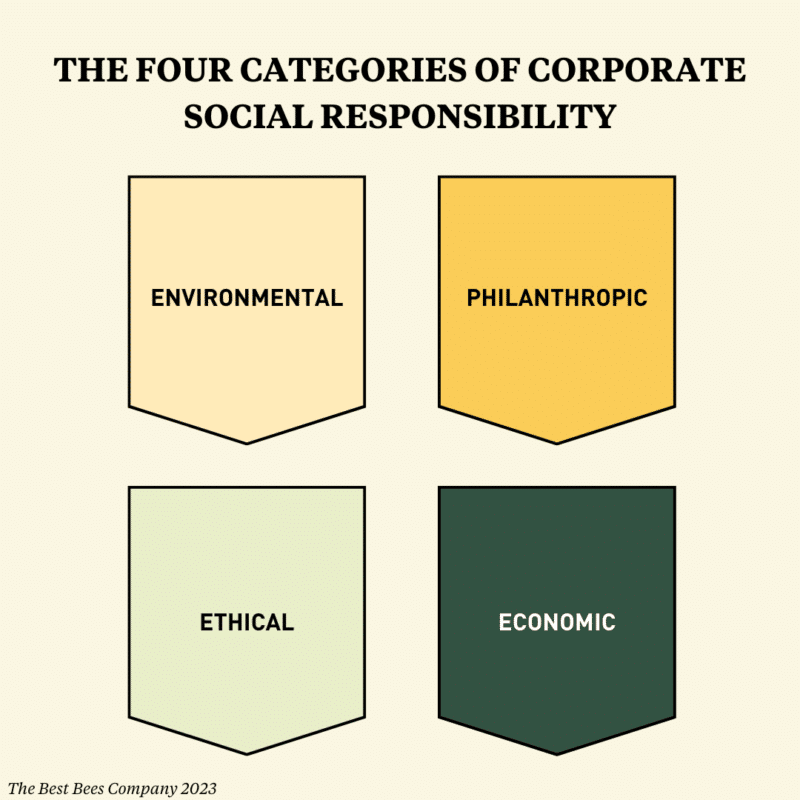Contents:
- What is Corporate Social Responsibility?
- Key Takeaways
- History of Corporate Social Responsibility
- Categories of Corporate Social Responsibility
- What to Avoid When Creating Corporate Social Responsibility Programs
- Examples of Corporate Socially Responsible Companies
- Business Benefits of Corporate Social Responsibility
- Why is Corporate Social Responsibility Important?
- FAQs
What is Corporate Social Responsibility?
Corporate social responsibility, or CSR for short, is a form of self-regulation that reflects a business’s accountability and commitment to using its resources to contribute to the well-being of society.
~The TNFD is the first sustainability reporting framework specifically designed for biodiversity and nature-related issues. Download our white paper to learn how it’s prompting businesses to take decisive action~
There are a variety of mandatory regulations at regional, national, and international levels for businesses. However, many companies choose to go beyond these legal requirements and incorporate practices that demonstrate their commitment to going above and beyond for the greater good.
Today, CSR plays an important role in a company’s brand perception, which impacts their attractiveness to customers, potential employees, and investors.
Key Takeaways
- Corporate social responsibility is the concept that a business has a responsibility to contribute to the greater good, not just make profits.
- CSR helps to improve various aspects of society as well as promote a positive brand image.
- CSR practices can raise workplace morale, as well as make a company more attractive to prospective employees, investors, and customers.
- CSR can be broken into four broad categories: environmental impacts, ethical responsibility, philanthropic endeavors, and economic responsibilities.
- Pollinator programs are impactful ways to demonstrate corporate social responsibility.
History of Corporate Social Responsibility
CSR really has its roots in corporate philanthropy. Andrew Carnegie challenged wealthy people to support social causes; his book The Gospel of Wealth argued that extremely wealthy Americans (like himself) had a responsibility to spend their money in order to benefit the greater good. John D. Rockefeller, following Carnegie’s example, donated more than half a billion dollars to various educational, religious, and scientific causes.
It wasn’t until the 1940’s, however, that businesses, not the individuals that owned them or held shares in them, could support charities. Howard Bowen, an American economist, is often cited as the “father of CSR”. In his 1953 book, Social Responsibilities of the Businessman, he writes, “Corporate social responsibility refers to the obligations of businessmen to pursue those policies… which are desirable in terms of the objectives and values of our society.”
The 1960’s saw an increase in social and environmental movements. Books such as Silent Spring (1962) by Rachel Carson and The Population Bomb (1968) by Paul R. Ehrlich began raising questions in regards to the limits of economic growth and the impact that society and corporations were having on the environment. The growing protest culture, revolving around civil rights and anti-war sentiments, put pressure on companies to part from the problematic status quo they had previously adhered to.
In the 1970s, the idea of CSR had truly begun to take hold in the US. The Committee for Economic Development acknowledged the concept of a social contract between businesses and society; the idea that business functions because of public consent, therefore business has an obligation to constructively serve the needs of society.
This idea of a social contract took hold, and continued to evolve and guide how businesses operated. Even as the government reduced its role regulating corporate behavior during the 1980’s, the expectations of society still demanded that businesses make an effort to contribute to the greater good.
The basis of modern CSR is rooted in Archie Carroll’s 1996 “Pyramid of Corporate Social Responsibility.” It established four different types of responsibilities for corporations: Economic, Legal, Ethical, and Philanthropic. After almost three decades since its introduction, the Pyramid continues to be highly relevant, and continuously debated and modified by academics, professionals, and politicians. Today, the most generally accepted categories are: Environmental, Philanthropic, Ethical, and Economical.
Categories of Corporate Social Responsibility
1. Environmental
This category refers to a company’s commitment to sustainability and environmental stewardship. To demonstrate this, many companies use Corporate Sustainability Programs. These programs encompass specific strategies that can be implemented to protect, conserve, or improve the environment. Some examples include:
- Regulating energy consumption by increasing reliance on renewable energy sources, implementing energy-saving methods (such as green roofs), and using recycled materials.
- Reducing harmful practices, such as decreasing pollution, greenhouse gas emissions (lowering their carbon footprint is a popular initiative for many corporations), the use of single-use plastics, and water consumption.
- Offsetting negative environmental impact with habitat restoration initiatives (such as planting pollinator gardens), funding research, and donating to related causes.
- Improving their immediate environment by bringing beehives to their site, promoting biodiversity and ecosystem services.
2. Philanthropic
This category focuses on a company’s efforts to make the world, society, and their immediate community a better place. A popular way to demonstrate this aspect of CSR is donating money from company profits to worthy causes, often in the form of a trust or foundation. Companies can also dedicate time, labor, or other resources to a cause of their choice through volunteer work, charity drives, fundraising campaigns, etc.
3. Ethical
Ethical responsibility is demonstrated by a company committing to operating in a fair and ethical manner. Unlike the two categories before, this one focuses on the practices and operations within a company. Many companies demonstrate ethical responsibility by providing equal pay, comprehensive benefits, and a competitive wage. Other ethically responsible practices include using fair labor practices, running campaigns to end workplace discrimination, refusing to purchase products made with slave or child labor, and more.
4. Economical
Economic responsibility refers to the practice of making financial decisions that are based upon contributing to the greater good, not just greater profits. This category is often interwoven with the previous three – for example, it may be more expensive to use sustainable materials, but an economically responsible company will choose to pay the higher rate in order to support a healthier planet. Another example would be a company refusing to work with suppliers who engage in questionable labor practices, even though it would save them money to do so.
What to Avoid When Creating a Corporate Socially Responsible Business
Companies should make sure that the objectives of their CSR programs are clear, reportable, and measurable. Vague promises will come across as insincere, and lack of transparency will undermine actions taken in the name of social responsibility.
One of the benefits of CSR is cultivating public trust; a surefire way to destroy that is by using any advertising or communication that could be seen as manipulative or harmful. Companies need to make sure they are walking the walk and doing what they say they will, or else risk customer, employee, and societal backlash.
Examples of Corporate Socially Responsible Companies

TOMS: Toms, the shoe company, donates one-third of its net profits to charities that support physical and mental health, as well educational opportunities.
Johnson & Johnston: The brand Johnson & Johnson invests in alternative energy sources, as well as working to increase their percentage of women and BIPOC people in management positions.
LEGO: The toy company has invested millions of dollars into addressing climate change and reducing waste. Its efforts include reduced packaging, sustainable materials, and investments in alternative energy.
Ben & Jerry’s: The ice cream maker has been a strong example of a company with great CSR for decades. In 1985, it established the Ben & Jerry’s Foundation, an organization dedicated to supporting grassroots movements that drive social change.
Levi Strauss: In 2011, Levi’s announced its Worker Well-Being Initiative, which demonstrates the brand’s commitment to creating a more sustainable supply chain. The company partners with suppliers and local organizations to implement programs focused on financial empowerment, health and family well-being, and equality and acceptance.
Business Benefits of Corporate Social Responsibility
When a company commits to socially responsible practices, it benefits them in the long run. CSR positively impacts employee satisfaction and retention, and is great for brand identify because CSR initiatives help to increase customer trust and public respect. A recent global study found that consumers are four to six times more likely to purchase, protect, and champion purpose-driven companies. Additionally, CSR initiatives can attract prospective employees, investors, and stakeholders who carry personal convictions that match those of the company.
CSR can also help to increase profits overall; reconfiguring operations to use less energy and produce less waste, for example, allows a company to become more environmentally friendly while reducing energy and materials cost.
Why is Corporate Social Responsibility Important?
Corporate social responsibility is important because it is a way for companies to hold themselves accountable for their impact on their community, society, and the world. When a company demonstrates CSR, it helps them attract and retain employees, stand out from competition, earn the trust of consumers and the general public, and improve their bottom line.
The 2015 Cone Communications/Ebiquity Global CSR study found that 91% of global consumers expect businesses to operate responsibly to address social and environmental issues. Furthermore, 84% say they seek out responsible products wherever possible. This makes it obvious that the demand and expectation for companies to contribute to the greater good is overwhelming. Companies who want to be successful in today’s market should have clearly demonstrable social responsibility practices.
FAQs
Q: What is corporate social responsibility?
A: Corporate social responsibility (CSR) is the concept that a business has a responsibility to contribute to the greater good, not just make profits.
Q: What are the four categories of CSR?
A: Environmental, Philanthropic, Ethical, and Economical.
Q: Why is corporate social responsibility important?
A: Not only can CSR models increase business and revenue, they promote change and progress throughout the world.
Q: What kind of businesses should commit to CSR?
A: Businesses that want to stay relevant and help people in need around the world while increasing their own revenue and efficiency will benefit from embracing CSR.









